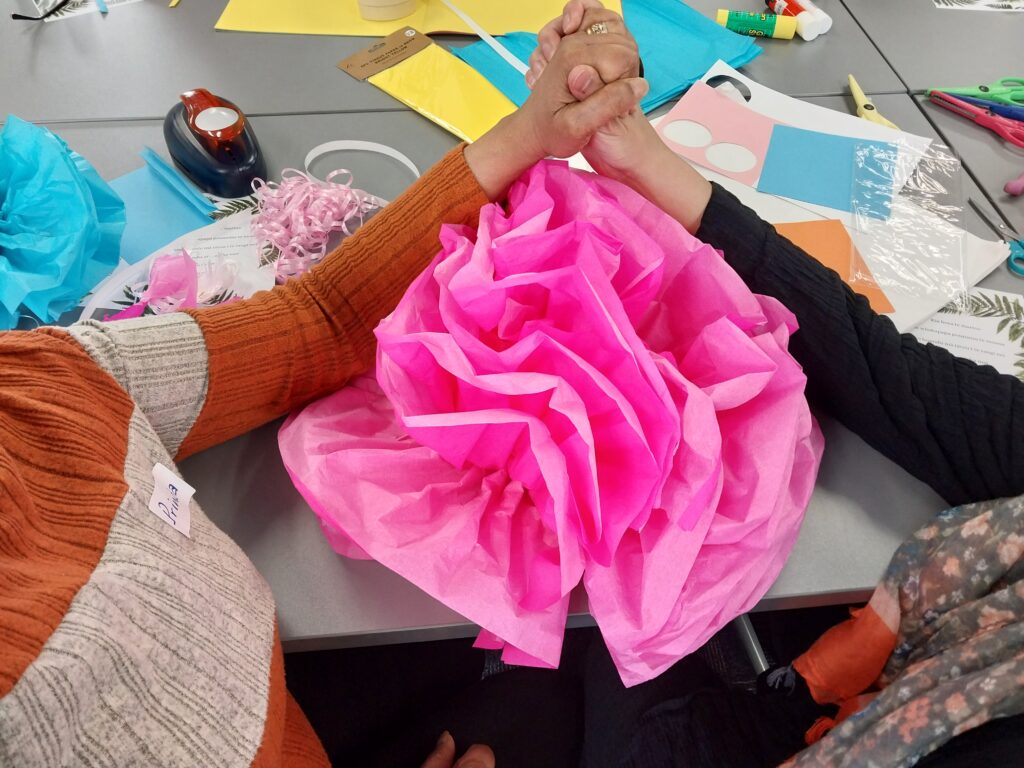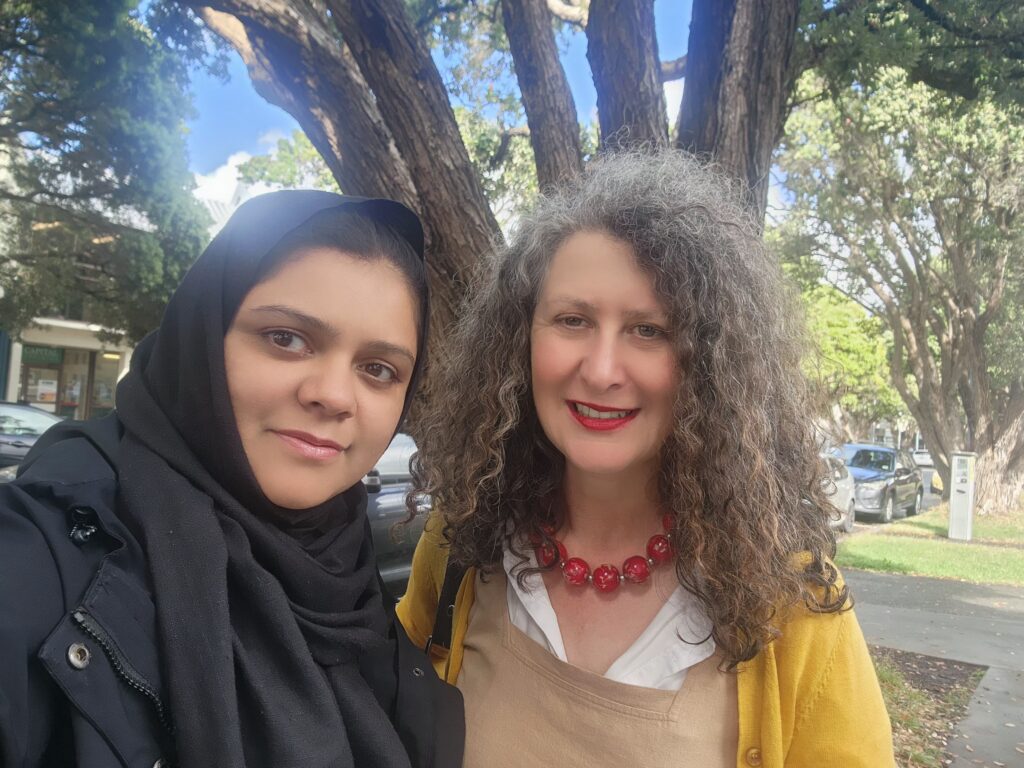




The Women’s Friendship Project
The Women’s Friendship Project is a powerful example of community-led development in action. As part of her mahi in the 2024 Inspiring Communities Micro-Credential in CLD Facilitation, Deirdre Meskill helped shape and grow this initiative, fostering deep connections between locally-connected women and former refugees. Through collaboration, trust-building, and cultural responsiveness, the project has created a welcoming space for relationships to flourish, strengthening community ties and inspiring future possibilities.
Micro-credential 2024 Cohort Profile
The Women’s Friendship Project is a community initiative led by Deirdre Meskill, who serves as a Community Facilitator for Catholic Social Services (CSS) and the Ecology, Justice and Peace Commission in the Catholic Archdiocese of Wellington. Her mahi focuses on supporting local initiatives and advocating for systemic change.
I’ve been in this role for almost two years, connecting with communities to see where CSS might thread in facilitation and skills. I’ve worked and volunteered for over 20 years in various capacities in church, school, and Irish community groups, often in roles involving change processes and facilitation. This project reflects my passion for creating meaningful connections between people.
The Beginnings: Listening and Connecting
The Women’s Friendship Project emerged from Catholic Social Services’ partnership with Red Cross on refugee resettlement mahi. Our volunteers expressed a wish to connect more deeply with the people they were supporting. At the same time, CSS observed increasing loneliness, isolation, and polarisation in society.
I became involved in December 2022, co-leading a pilot project in Pōneke with Changemakers. We connected former refugee women and locally-connected women for intentional friendships. With a small group of three pairs meeting for six months, the experience was very positive. However, there were challenges with finding participants for the next round, so I began exploring Te Awakairangi as a new location, where housing availability has drawn newly-settling communities.

Applying CLD Principles: Building Relationships and Trust
I met with Welcoming Communities Officers from Te Awakairangi ki tai and Te Awakairangi ki uta, and we held a hui with seven parties, including women leaders from two newly-settling communities. From this, a core group emerged: one leader from the Ahmadiyya community, two Welcoming Communities Officers, and CSS.
My role as lead enabler involved facilitating connections. Maleeha, the Ahmadiyya community leader, became the key connector to her community, and the Welcoming Communities Officers supported us as connectors to local resources. I recognised the absence of mana whenua at the table, and the Welcoming Communities Officers, who had relationships with mana whenua, confirmed they would connect at the appropriate time, given the many demands on mana whenua’s time and resources.
We prioritised whakawhanaungatanga (relationship building) and manaakitanga (hospitality).
We began with kanohi ki te kanohi hui to build relationships. We included kai and ensured cultural considerations were respected. Karakia was a meaningful way to honour Te Tiriti and find common ground in our diversity.
Trust and relationship-building were central. Then Maleeha and I met separately in addition to group hui to discuss challenges, such as power dynamics. Together, we found a mana-affirming way forward.

Adapting to Community Needs
In the Pōneke pilot, women were paired for one-to-one friendships. However, in Te Awakairangi, the collective culture of the Ahmadiyya community required a different approach. The project evolved into community gatherings.
We adapted our plans, including changing the venue from a church hall to a local library—a neutral and welcoming space suggested by a Welcoming Communities Officer. We also adjusted our expectations for attendance. Though fewer women than planned attended the first gathering, the feedback exceeded our expectations. Women told us it was fun and that they would come again.
I co-facilitate the gatherings alongside Maleeha. Each gathering follows a simple format:
- Karakia
- Whanaungatanga – connecting who is in the room and grounding the project
- Icebreaker activities – pairing women to mix and have fun
- Social time over kai
The gatherings are relaxed and welcoming, with no burden on the women to prepare food. They can bring their children, and we add special touches like attractive table settings to show appreciation. The women are now suggesting activities, leading them, and even planning to meet outside the gatherings.
Reflections and Learnings
This project has two distinct phases: the long lead-in planning and the gatherings. The planning phase required patience, trust-building, and adapting to community needs. I faced challenges, particularly in recruiting locally-connected volunteers. Mentors reminded me to trust the community-led process—that the right people would come. This has proven true, with women now inviting others to join.
Key reflections include the importance of:
- Taking time to build trust and relationships
- Acknowledging power dynamics and enabling shared leadership
- Tailoring cultural awareness training developed and led by the community
- Creating a welcoming, low-pressure environment
Feedback from Maleeha has been invaluable. While she initially saw me as the project lead, we’ve grown into a partnership where she provides candid insights, such as her cultural expectations for directness. This feedback has deepened our collaboration and my own self-awareness.
Ongoing Impact and Broader Connections
I bring three lenses to this mahi:
1. Connection – Everything is connected. This project has sparked new relationships within and beyond the community.
2. Encounter – Inspired by Pope Francis, I focus on creating spaces for genuine connection across differences.
3. Whakapapa and Justice – As a first-generation Irishwoman, I bring an awareness of colonisation and social justice, which helps me connect with women from migrant backgrounds.”
The Women’s Friendship Project embodies these values, fostering trust and mutual support among women from diverse cultures. As the initiative grows, Deirdre is hopeful that it will continue beyond its initial funding, sustained by the women’s enthusiasm and leadership.
This project shows how much hope lies in connection and common ground. It’s a privilege to support these women as they build meaningful relationships and spark possibilities for the future.
This case study is drawn from Deirdre Meskill’s mahi over the course of the Micro-Credential in Community-Led Development (CLD) Facilitation. Shared in her own words, it has been lightly edited by Inspiring Communities for clarity and to suit a blog format while staying true to her experience and insights..
